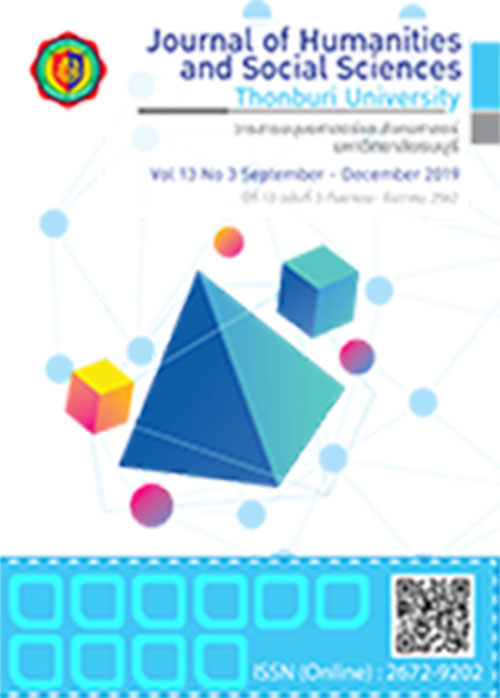STRATEGIC MANAGERIAL ACCOUNTING EFFECTIVENESS OF THE FIRMS WITHIN THAI LISTED COMPANIES: IMPACTS ON COST LEADERSHIP AND FIRM WEALTH
Keywords:
strategic managerial accounting effectiveness, cost leadership, firm wealthAbstract
The study examined the impact of strategic managerial accounting effectiveness and firm wealth, where cost leadership was taken as a mediator. The key participants in this study were Chief Executive Officers (CEOs) who worked in Thai listed companies. Of the surveys completed and returned, only 293 were usable. The ordinary least squares (OLS) regression analysis was employed to estimate parameters in hypotheses testing. The findings show that strategic managerial accounting effectiveness, which consists of lean improvement, risk management, and performance evaluation, has the significant positive effect on cost leadership (p<0.05). Cost leadership significantly mediates the relationship between strategic managerial accounting effectiveness and firm wealth (p<0.1). However, strategic managerial accounting effectiveness has the significant positive effect on firm wealth (p<0.05). Therefore, a key decision for managers in all levels and functions is to focus at strategic managerial accounting effectiveness that can improve and develop cost leadership’s effectiveness and boost firm wealth.
References
Appelbaum, D. et al. (2017). Impact of business analytics and enterprise systems on managerial accounting. International Journal of Accounting Information Systems. 25: 29-44.
Arquero, J. et al. (2017). Relationships between communication apprehension, ambiguity tolerance and learning styles in accounting students. Revista de Contabilidad. 20(1): 13-24.
Arora, A. and A. Fosfuri. (2003). Licensing the market for technology. Journal of Economic Behavior & Organization. 1522, 1-19.
Asker, A. et al. (2001) Marketing Research. New York: John Wiley and Sons.
Barman, M. et al. (2017). Performance and impact evaluation of solar home lighting systems on the rural livelihood in Assam, India. Energy for Sustainable Development. 38: 10-20.
Cipriano, X. and G. Gamboa, et al. (2017). Developing indicators to improve energy action plans in municipalities: An accounting framework based on the fund-flow model. Sustainable Cities and Society. 32: 263-276.
Deng, F. and L.-Y. Zhang (2017). Elimination of policy conflict to improve the PDP evaluation performance. Journal of Network and Computer Applications. 80: 45-57.
Ibarrondo-Dávila, M. et., al. (2015). Managerial accounting for safety management. The case of a Spanish construction company. Safety Science. 79: 116-125.
Hair, J. et al. (2006). Multivariate data analysis. New Jersey: Pearson Educations, Inc.
Kumarasiri, J. and A. Gunasekarage (2017). Risk regulation, community pressure and the use of management accounting in managing climate change risk: Australian evidence. The British Accounting Review. 49(1): 25-38.
Libby, R. et al. (2015). Regulation and the interdependent roles of managers, auditors, and directors in earnings management and accounting choice. Accounting, Organizations and Society. 47: 25-42.
Luo, X. et al. (2017). Performance evaluation of an agent-based occupancy simulation model. Building and Environment. 115: 42-53.
Ma, L. et al. (2017). Economic performance evaluation of process system design flexibility options under uncertainty: The case of hydrogen production plants with integrated membrane technology and CO2 capture. Computers & Chemical Engineering. 99: 214-229.
Marius, C. et al. (2012). Managerial Accounting – a Source of Information for an Efficient Management in SME. Procedia - Social and Behavioral Sciences. 62: 521-525.
Masquefa, B. et al. (2017). Developing appreciation of micro-organizational processes of accounting change and indicating pathways to more ‘Enabling Accounting’ in a micro-organizational domain of research and development. Critical Perspectives on Accounting. 44: 59-82.
Merlo, O. et al. (2012). Marketing's reputation and influence in the firm. Journal of Business Research. 65(3): 446-452.
Noordin, R. et al. (2015). Performance Outcomes of Strategic Management Accounting Information Usage in Malaysia: Insights from Electrical and Electronics Companies. Procedia Economics and Finance. 31: 13-25.
Nuttavong Poonpool et., al (2017) Impact of internal control success on invester confidence of listed companies in the stock exchange of thailand (set). RMUTT Global Business and Economics Review. 12 (1), 43.
Otley, D. (2016). The contingency theory of management accounting and control: 1980–2014. Management Accounting Research. 31: 45-62.
Panwar, R. et al. (2016). The effect of small firms' competitive strategies on their community and environmental engagement. Journal of Cleaner Production. 129: 578-585.
Pattarasiri Thiptanamanee. et al. (2018). The effects of antecedents on modern human resource accounting implementation: empirical study of information and communication technology firms in thailand. Journal of Thonburi University. 12 (29), 19-29.
Su, S. et al. (2017). China’s megaregion policy: Performance evaluation framework, empirical findings and implications for spatial polycentric governance. Land Use Policy. 63: 1-19.
Zahra, S.A. et al. (2000). “Privatization and entrepreneurial transformation: Emerging issues and a future research agenda.” Academy of Management Review, 25 (3), 509–24.







